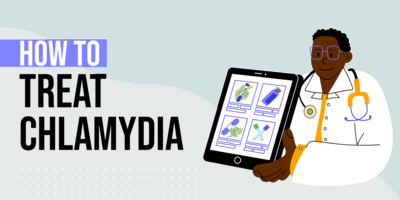
How to Treat Chlamydia
Chlamydia is a bacterial infection that is spread by sexual contact, according to the CDC. It is one of the most...
Read moreHelp patients book appointments with you on Solv. It's free!
6 instant-book locations

No more surprise bills. Solv is committed to making getting healthcare as easy as buying groceries at the store, including knowing the price of care upfront.
Help patients book appointments with you on Solv. It's free!
Chlamydia is a sexually transmitted infection (STI) that can affect men and women alike. Chlamydia is one of the most frequent STDs, according to the National Institutes of Health (NIH).
Chlamydia is a bacterial infection spread by vaginal, oral, or anal sex with someone who is infected. According to the CDC, chlamydia can cause substantial damage to a woman's reproductive system if left untreated, leading to infertility or fatal ectopic pregnancy.
According to the National Institutes of Health, many persons with chlamydia have no symptoms and can unknowingly transfer the disease to others. Abstaining from sex, using latex condoms, and being in a long-term mutually monogamous relationship with a partner who does not have chlamydia are all recommended by the CDC as the best strategies to prevent chlamydia.According to the National Institutes of Health, many persons with chlamydia have no symptoms and can unknowingly transfer the disease to others. Abstaining from sex, using latex condoms, and being in a long-term mutually monogamous relationship with a partner who does not have chlamydia are all recommended by the CDC as the best strategies to prevent chlamydia.
Chlamydia is spread through unprotected sexual contact with someone who is infected. According to the CDC, you can catch chlamydia even if your sexual partner is a man who is afflicted with the STD and does not ejaculate during sexual activity. If you are pregnant and have chlamydia, you can transmit it to your kid during childbirth, according to the CDC.
A chlamydia test is a laboratory test that searches for the bacterium chlamydia in your body. This test can be done as a urine or swab test, according to the CDC.
Both men and women can take the urine test, whereas only women can take the swab test. The NIH reports that during a pelvic exam, an STD test provider takes a sample of cells with a small brush or cotton swab.
Antibiotics are a simple way to cure chlamydia. The CDC recommends a seven-day antibiotic course for chlamydia treatment. The CDC warns that while this will end the infection, it will not be able to heal any harm caused by the sickness. It also recommends that you refrain from sexual activity for at least seven days or for the duration of your chlamydia treatment.
A chlamydia test is an STD test that can determine whether or not you have chlamydia. It can be done as a urine test or a swab test, according to the NIH, though the swab test is usually only done on women. A chlamydia test is available from many healthcare professionals who provide lab test services.
According to the National Institutes of Health, a chlamydia test is used to determine the presence of chlamydia bacteria in the body. Even if you don't have any symptoms, it can be used to confirm whether you have chlamydia. Chlamydia symptoms include pain when peeing and frequent urine, according to the National Institutes of Health. In women, it can cause abnormal vaginal bleeding, while in men, it can induce discharge from the penis.
A chlamydia test can tell you if you have the STD and help you avoid spreading it to others. The National Institutes of Health recommends yearly chlamydia tests for sexually active women under the age of 25, males who have sex with men, HIV patients, and pregnant women under the age of 25. This STD test is especially advised for women over 25 who have had several sex partners and whose partners have used condoms incorrectly or inconsistently.
The chlamydia test provider will ask you to urinate into a sterile collecting cup during the urine test, according to the National Institutes of Health. The presence of chlamydia germs in your urine sample is checked by lab technicians. During a pelvic exam, a healthcare provider will use a swab or brush to capture a sample of cells, according to the National Institutes of Health. The sample is subsequently sent to a laboratory for analysis.
According to the National Institutes of Health, lab test providers may encourage women who are having a chlamydia test to refrain from using vaginal douches or lotions for at least 24 hours before the test. Men and women may also be requested to refrain from taking antibiotics for at least 24 hours prior to the STD test.
According to the University of Wisconsin, chlamydia symptoms normally appear one to three weeks following exposure to the infection. However, according to the university, 75 percent of women and 50 percent of men with chlamydia have no symptoms. The only method to know if you have chlamydia is to take a chlamydia test from an STD testing center.According to the University of Wisconsin, chlamydia symptoms normally appear one to three weeks following exposure to the infection. However, according to the university, 75 percent of women and 50 percent of men with chlamydia have no symptoms. The only method to know if you have chlamydia is to take a chlamydia test from an STD testing center.
After you've finished treatment, you shouldn't test positive for chlamydia anymore. Chlamydia can be successfully treated with azithromycin or doxycycline, according to the University of Rochester Medical Center. People with lymphogranuloma venereum, a kind of chlamydia, may require 21 days of treatment, according to the University of Rochester Medical Center. Furthermore, the institution advises abstaining from all sexual activity for at least seven days or until chlamydia therapy is completed.
Many healthcare providers that offer lab tests and STD testing services, such as hospitals, urgent care centers, and walk-in clinics, offer a chlamydia test. One of the simplest and most convenient ways to find chlamydia test providers in your neighborhood is to use Solv. To find top-rated providers and make an appointment online, type "chlamydia test" or "STD testing" into the search area on Solv's website, then input your location.
Solv has strict sourcing guidelines and relies on peer-reviewed studies, academic research institutions, and medical associations. We avoid using tertiary references.
Annual Wellness Exam in Montana
Chickenpox Vaccine in Montana
DOT Exam in Montana
Ear Wax Removal in Montana
Eye Exam in Montana
Flu Shot in Montana
Hepatitis Vaccine in Montana
Measles Vaccine (MMR) in Montana
Pap Smear in Montana
Physical Exam in Montana
Shingles Vaccine in Montana
Sinus Infection Treatment in Montana
Sports Physicals in Montana
Tetanus Shot in Montana
Typhoid Vaccine in Montana
Well-Woman Exam in Montana
Yellow Fever Vaccine in Montana
A1C Test in Montana
CMP Test in Montana
Chlamydia Test in Montana
Diabetes Test in Montana
Gonorrhea test in Montana
H Pylori Test in Montana
HIV Test in Montana
Hepatitis test in Montana
Herpes Test in Montana
Mono Test in Montana
Pregnancy Test in Montana
STD Testing in Montana
Strep Test in Montana
Syphilis test in Montana
TB Test in Montana
Thyroid Test in Montana
Trichomonas Test in Montana
Vitamin D Test in Montana
Tips, advice, news—your resource to stay healthy and safe while improving your experience with healthcare providers when you need them.